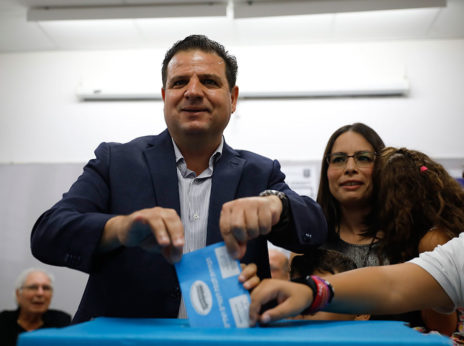
As of July 20, 2019, Benjamin (Bibi) Netanyahu became the longest-serving prime minister in Israel’s history, edging out the founding prime minister, David Ben-Gurion.
In the general election on Sept. 17, he narrowly failed to secure a majority for his Likud Party. It marked a sea change in Israeli politics and history, a visible blow to the right-wing hegemony that has not only prevented solutions to the ongoing crisis of the Occupation but deepened it. Yet in the end, for reasons we’ll explain, little may change in the short term. The concluding chapter of the election story has yet to be written.
It’s a complex story owing to Israel’s parliamentary system, whereby in a nation and a Knesset sharply divided over ideology, religion, and ethnicity, governments have ruled by fragile, shifting coalitions, often of parties not otherwise friendly, designed to distribute government spoils and satisfy competing constituencies.

The September election was a re-run of the election on April 9, in which Likud narrowly won a plurality. A new upstart party, Blue and White, led by General Benny Gantz, came close to upsetting Bibi’s long-time tenure. Gantz’s platform was not so different from Bibi’s, but he came close to defeating him in the wake of public disgust with Netanyahu’s corruption, for which he is under indictment for financial and political crimes.
Nevertheless, after Israel’s President Reuven Rivlin asked Netanyahu to form a governing coalition, he couldn’t do it. The Knesset has 120 seats, and Bibi could not cobble together 61 seats, even with all the concessions such deal-making entails. Therefore, a new election had to be called for September in the hope that some voters might rethink their strategy for moving forward out of the morass.
This time, Blue and White came out ahead with 57 seats committed to a governing coalition, and Likud with 55. The difference this time came from the open support of Benny Gantz from the Joint List, a coalition of small Arab parties that includes Hadash, a configuration of the Communist Party of Israel, and led by a Palestinian Israeli, Member of Knesset (MK) Ayman Odeh. The List also includes the exclusively Arab Ta’al, the Islamist Ra’am, and the nationalist Balad. The Joint List took 10.6% of the vote and 13 Knesset seats, becoming the third-largest party in Israel.
On the question of the Occupation, Benny Gantz does not appreciably separate himself from the hardline Likud position. Yet for years Netanyahu has run a fear-based politics of no rights for Israel’s Palestinian citizens, appealing to Jews to vote for him because “the Arabs are stealing the election” and “voting in droves” (as if as citizens of Israel it’s not their right to vote). In recent elections, Likud set up video cameras at Arab polling stations to intimidate voters.
What the Joint List found more to their liking about Gantz is that at least he did not engage in openly racist anti-Arab hate-mongering and seemed willing to talk with Palestinian leaders respectfully. More than that, Gantz invited Odeh to speak at a Blue and White-Labor-Meretz election rally in Tel Aviv, where he received a tumultuous ovation.
Even so, Gantz would not have allowed the Joint List to actually form part of the government: That would have ignited a firestorm of Zionist outrage. But for numerical purposes, in order to form a majority in the Knesset, Joint List votes would be counted.
With Gantz in office, existential questions of Zionism and Occupation would not be addressed, but perhaps other issues might be, such as Israeli child poverty, the highest rate of any OECD country, affecting nearly half of Israel’s Palestinian citizens.
A shared future?
Traditionally, the president offers the party with the plurality vote the right to try forming a governing coalition. That is what happened in April, and Netanyahu failed. Most observers expected that this time Rivlin would make the offer to Gantz. But he did not. Instead, on Sept. 25, he offered it again to Netanyahu. Because in the meantime, one of the Joint List partners, the Palestinian nationalist party Balad, withdrew its three seats in protest against Gantz, eliminating his lead, a move that upset Odeh over his Joint List partner’s apparent unwillingness to learn to work with Jews. As proof that life is more real than rhetoric, the numbers, now 54 for Gantz to Bibi’s 55, gave the nod to Likud. So Netanyahu was back in the hot seat, desperately trying to hold onto the prime ministership as his wall of protection against conviction on corruption charges.
Netanyahu floated the idea of a Unity government, with himself, naturally, continuing as prime minister, at least for two years, to be followed by two years for Gantz—though who knows what could happen in two years: Netanyahu has proved himself a master manipulator. An Israeli Unity government would cut out not only the Joint List, but the left-wing Labor and Democratic Union (Meretz) parties, both of which lost seats in the Knesset, and the right-wing nationalist and religious parties. The government would be right-wing and secular, and continue to do nothing about resolving Palestinian claims both within Israel and in the West Bank and Gaza.
Gantz was unwilling to come into unity with the very party and man he twice ran against with considerable success.

One rather intriguing feature of a Unity government would be that the Joint List would then become the official leader of the opposition, entitling Ayman Odeh to be brought into consultation on state and foreign affairs and national security. It is anticipated, however, that in such a case, some loophole in the law would be found to prevent Arab representation at that level.
As Odeh stated in a Sept. 22 New York Times op-ed piece, “Our decision to recommend Mr. Gantz as the next prime minister without joining his expected national unity coalition government is a clear message that the only future for this country is a shared future, and there is no shared future without the full and equal participation of Arab Palestinian citizens.”
Significantly, Odeh is one of several confirmed Palestinian speakers for the “pro-Israel, pro-peace” J Street National Conference in late October in Washington, D.C., expected to attract some 2,000 people, including Democratic presidential candidates who will lay out their visions for Israel/Palestine and the Middle East.
As of Oct. 21, Netanyahu (on his 70th birthday) revealed that he had failed again to form a government, so now the charge goes to Gantz. Other parties might become more flexible now and agree to join a Gantz government. Israeli politics, as much as or more than anywhere, is classic horse-trading. He has 28 days to try putting together a government. Perhaps Balad can be persuaded to return to the coalition, but that will still not be enough. Gantz will have to secure the partnership of at least one other party.
An interesting topic is the estimated 4,900 Jews across the country, even some in right-wing settlement communities and all-Jewish towns, who voted for the Joint List. They could have voted for liberal Zionist parties such as Labor or Meretz but chose instead to throw their weight toward Arab-led parties as a sign of support for the principle that Israel’s problems can and will only be solved be strengthening the Arab-Jewish coalition. Whatever they may profess publicly, these Jews objectively are declaring themselves “non-Zionists” who envision a future for all of Israel’s citizens without discrimination. Of the five Knesset seats won by Hadash, which is mostly Arab but has Jewish members also, one of them will go to the Jewish Ofer Cassif.
Pragmatism over ideology
The importance of the Joint List vote, and of the plurality that voted for Gantz and against Netanyahu should not be underestimated. It can be seen as a sign that the left, however it is reconstituted, is not dead, but focused on pragmatic rather than ideological goals. The Israeli “Old Left”—the Labor Party and other leftist Zionists who founded and led the country for its first thirty-odd years—has been marginalized. It may be time finally to acknowledge that a successful reconciliation of Zionism and egalitarian democracy was always a highly problematic project, if not indeed impossible. It was bound one day to reach a critical crossroads.
The fact that Netanyahu was defeated at the polls, that once again he could not form a government, sent shivers down the spines of Reaction. Likud polled lower in September than in April, so this may open up space for other voices in the party calling for him to pass the baton to less abrasive—and less criminal—leaders. And once out of office, Netanyahu may well land in prison.
A Gantz government would be a relief to the American Jewish establishment, and to a plurality of voters in Israel, because it would offer some welcome stability to the country after all of Netanyahu’s chaos and offensively open racism. An Israel led by Gantz would be far more amenable to U.S. Democratic voters and politicians—and for better or worse, help to regain bipartisan American support. Notably, Netanyahu’s defeat elicited scant attention from the White House. A political corner may have been turned. Sixty percent of eligible Palestinian Israelis voted: An even larger turnout would make an even greater difference by shifting the balance of power.
If Gantz, too, is unable to form a government, the president has the right to call upon any MK to try and patch together a minimum of 61 votes. Or he could call for an unprecedented third election.
The Joint List platform
What does the Joint List stand for? Its platform contains these major points:
- A just peace based on the June 4, 1967, borders, that includes end of the Occupation, dismantling of settlements and the separation wall, release of political prisoners, a fair resolution of the refugee problem, and an independent State of Palestine. [This position was misrepresented by Netanyahu as wanting to “destroy Israel.”]
- “Full equality, both national and civil, for the Arab-Palestinian public in Israel, as a homeland minority with collective and personal rights…. The List works to inculcate the values of pluralism and tolerance, and fights against the effects of violence, crime and the anarchy of weapons.”
- Elimination of “all manifestations of racism and fascism” and “the establishment of a democratic constitution that enshrines the values of equality, justice, and human rights, and basic social rights and democratic freedoms.” [Israel has never had a written constitution, an intentionally instituted flaw designed to allow interpretation of policy to evolve—or devolve—according to administration, practice, national emergency or military law, and judicial ruling.]
- “Workers’ rights, social and environmental justice…raise the minimum wage…guarantee the basic rights to health, education, welfare, and housing for all citizens.”
- “Equal rights for women in all spheres of life….”
- “Support and empower culture and art without discrimination or exclusion…preserve the status of the Arabic language as an official language….”
- “The Joint List rejects the imperialist involvement in the affairs of the countries of the region and the world, the policy of religious and ethnic divisions, and the dissolution of states and peoples. The List supports the right of peoples to independence, freedom, justice, and democracy.”
- “The Joint List is struggling to demilitarize the Middle East, including Israel, nuclear weapons and all weapons of mass destruction….”
The Joint List platform, which does not mention “Zionism,” is largely based on the Hadash program. Palestinian Israelis cannot afford the luxury of fighting “Zionism,” if by that is meant the existence of Israel as a nation-state in the world. They recognize that neither Israel nor its Jewish inhabitants are going anywhere. Their focus is instead on practical, achievable goals that can help bring Israeli citizens of all backgrounds together.
Aida Touma-Suleiman, for example, an MK representing the Joint List and Hadash, heads the Knesset’s Committee on the Status of Women and Gender Equality. In that capacity, she has traveled to Orthodox Jewish towns to join with women there protesting separate sidewalks for men and women.

Last October, Haifa, Israel’s third-largest city, with a long-recognized Arab minority, elected Dr. Einat Kalisch Rotem as its first woman mayor. A member of the now beleaguered Labor Party, she won her five-year term by forming a coalition that included Hadash, Meretz (which votes with Hadash 90% of the time), and an Orthodox party. Immediately, she was criticized by Netanyahu for including in her municipal government “anti-Israel” people. At the same time, the nationalist Arab parties criticized Hadash for serving in a “Zionist” administration. She responded that the problems of Haifa, such as pollution, housing, education, and equality, had nothing to do with Zionism. For deputy mayor, she appointed someone from Meretz for the first half of her term and another from Hadash for the second half.
In other municipal elections, the city of Lod is also exemplary. Yair Revivo, the incumbent mayor from the Likud Party, won handily, but the 90% turnout of the Palestinian vote earned Arab representation on almost half of the city council. No angry phone call came from Netanyahu in protest.
Although Israel/Palestine activists in America, as well as some in nationalist Arab parties within Israel, are laser-focused on “Zionism,” practical politics demands solutions to real, on-the-ground issues that go far beyond ideology.
Past experience backs up this strategy. In 1992, the Labor Party’s Yitzhak Rabin won his election with support from an Arab party and Hadash. Both knew they would not form part of his government, but by offering him his winning votes, they secured his majority and gained better treatment in Palestinian towns—schools, sewage, construction. Rabin also made progress at Oslo on the two-state solution—for which the fanatical Jewish nationalist/religious right wing gunned him down in 1995.
If Gantz is able to form a government, Palestinians feel that even without tackling the two-state problem, he might address other issues, such as the infestation of illegal weapons in Arab towns which are killing hundreds of Arab victims every year. Most of those weapons come from the Israeli Defense Forces. Crime is overlooked, and perhaps even tacitly promoted, so long as Arabs are killing Arabs.
The future of Israel will not be determined by elections alone. Some of the other groups working toward justice in various areas of civic life include:
Standing Together, a grassroots organization of Jews and Arabs.
Peace Now, founded in 1978, supporting two states based in the 1967 borders.
Yesh Gvul (There is a Limit), founded to support refuseniks during the first Lebanon War in 1982.
B’Tselem (In the Image of), the Israeli Information Center for Human Rights in the Occupied Territories.
Breaking the Silence, founded in 2005 to collect testimonies from Israeli soldiers.
Rabbis for Human Rights, working to legally prevent or reverse the takeover of Palestinian lands and homes.
Machsom (Checkpoint) Watch, a women’s organization monitoring occurrences on the borders between Israel and the Occupied Territories.
Physicians for Human Rights, founded in 1988 during the first Palestinian intifada.
Combatants for Peace, a volunteer organization of former Israeli and Palestinian fighters now committed to nonviolent means to promote peace.
The New Israel Fund, founded in 1979 and U.S.-based, supports a large number of democratic and civil rights organizations within Israel.
Yossi Khen made valuable contributions to this analysis.










